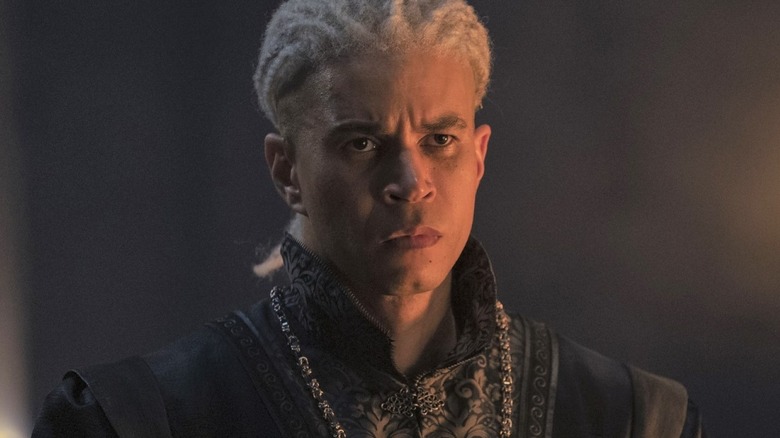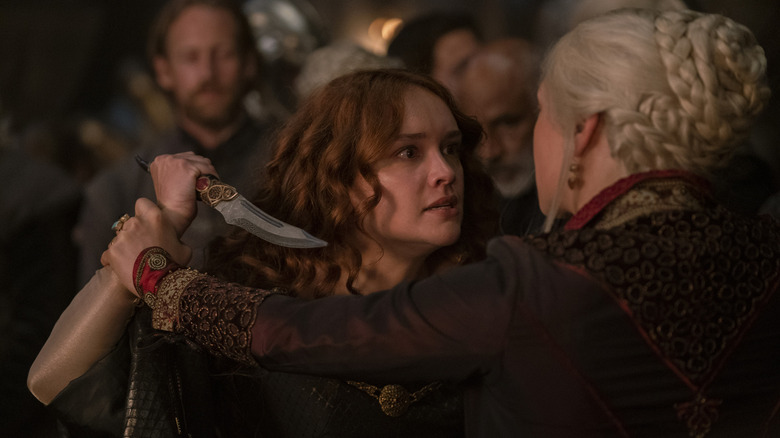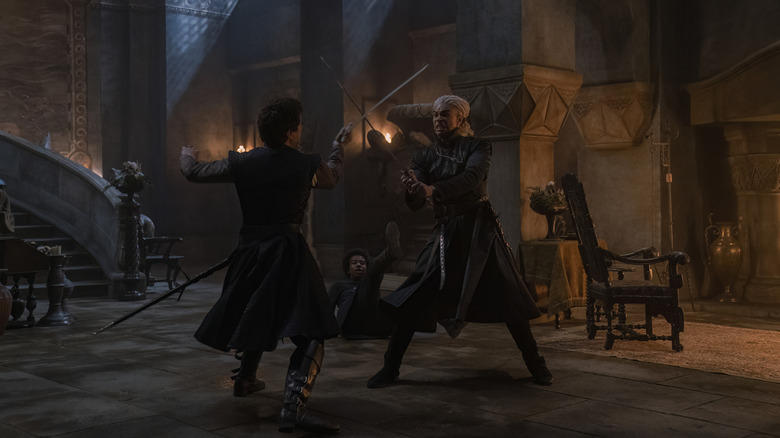Why Fire & Blood Doesn't Actually Spoil House Of The Dragon's Entire Plot
Like the infighting Targaryen family increasingly at each other's throats in "House of the Dragon," fans seem to have a pretty intense love/hate relationship with most adaptations these days. Make one mildly controversial change from the source material and may the gods (both the old and the new) save anyone who gets in the way of the backlash. After all, some may argue, aren't book readers justified after seeing how "Game of Thrones" — which eventually outpaced author George R.R. Martin's series of novels and left showrunners David Benioff and D.B. Weiss without any concrete roadmap to follow whatsoever — came to a divisive end in the later seasons?
The highly anticipated prequel series had its work cut out for it. Having to prove whether general audiences out there even had an appetite to return to Westeros at all (spoiler alert: they did) could've been daunting enough, but "House of the Dragon" had to do so without the benefit of some of the richest and densest modern fantasy books ever written.
Instead, the show has had to pull a similar trick to "The Lord of the Rings: The Rings of Power" and greatly expand on an absolute bare minimum of source material. Martin's "Fire & Blood" novel established all the major events the series has covered thus far, but showrunners Ryan Condal and Miguel Sapochnik have routinely gone far beyond what's on page to fill out entire episodes of drama and conflict — oftentimes to spectacular results.
The latest episode demonstrated this specific strength of "House of the Dragon" by turning roughly four pages from the book into an hour of television. What's more, a surprise twist on the story as described in "Fire & Blood" subtly cautions book readers that they won't always know what's going to happen next.
Turning text into subtext
Those behind "House of the Dragon" (George R.R. Martin himself is credited as a co-creator) faced several challenges when it came time to adapt the show from "Fire & Blood," which the author intentionally wrote as a limited, ambiguous, and rather dry historical retelling of the events of this time period. Rather than recreate that same approach in a different medium, however, "House of the Dragon" instead chose to take the broad, thinly-sketched outline of those events and fill in all the blanks.
For example, much of the latest episode takes place on Driftmark during the funeral of Laena Velaryon (Nanna Blondell) and adapts a segment of "Fire & Blood" that Martin all but brushes over in a few paragraphs. The difference on-screen couldn't be more apparent, given the final result that's imbued with much-needed subtext and several deeper layers of meaning.
We spend the first act of the episode (credited to writer Kevin Lau and directed by Sapochnik) entangled in a web of divided loyalties, bitter resentments, and volatile motivations between members of the Targaryen family. The simmering tension between Rhaenyra (Emma D'Arcy) and Queen Alicent (Olivia Cooke) could've filled the entirety of the hour, but the episode still finds room to further explore every ongoing thread: King Viserys (Paddy Considine) reaching out to his estranged brother Daemon (Matt Smith), Laenor's (John Macmillan) grief over his departed sister Laena, the ongoing attraction between Rhaenyra and Daemon, and even the rivalries between Rhaenyra and Alicent's respective children that explodes into violence between both generations.
Though vaguely covered in "Fire & Blood," all of these emotional conflicts are given far more weight in "House of the Dragon" than was ever present in Martin's novel — and the series is dramatically better for it.
Choose your own adventure
Another quirk of "Fire & Blood" comes from how the novel is filled — by design — with a recurring rotation of unreliable narrators, secondhand (and even thirdhand!) accounts of private exchanges between characters, and biased assumptions on the narrator's part that pose a challenging read to anyone looking for a simple and straightforward Wikipedia entry of the upcoming civil war known as the Dance of the Dragons.
With so many different possible interpretations of the same general story, "House of the Dragon" has already taken a fascinating approach to cutting through the murkiness and presenting a definitive take on significant events — most notably, by making Larys Strong (Matthew Needham) unequivocally responsible for the deaths of Harwin and his father Lyonel (Gavin Spokes) in last week's episode, which were deliberately left uncertain in the novel.
That trend continues once again with the show's unexpected statement on the fate of Laenor Velaryon.
"Fire & Blood" merely describes the death of Laenor as a result of being "stabbed to death by his friend and companion Ser Qarl Correy" after a loud and public disagreement that ended in both drawing swords against each other. The book's narrator, chronicling these events hundreds of years later, at least notes that "the circumstances of the murder remain a mystery" as there are several varying accounts of what actually happened. The darkest version suggests that Daemon was behind it all, which the show obviously takes as the true account ... though with the twist that Laenor simply faked his own death, allowing him and his lover Qarl (Arty Froushan) to live out the rest of their days in happy exile. Not only does this addition allow for a rare happy outcome, but it speaks to the confidence the writers have in reinterpreting and reimagining "Fire & Blood" as they see fit.
Change isn't always a bad thing, and few shows have proved that more than "House of the Dragon" with its clever, surprising, yet always faithful dynamic with its source material.


